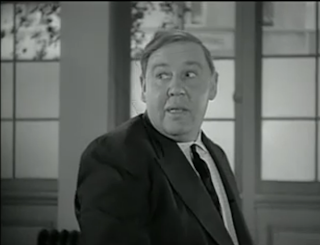Charles Laughton did not receive an Oscar nomination for portraying Albert Lory in This Land is Mine.
This Land is Mine is a fairly solid anti-Nazi film about about a school teacher in a Nazi occupied country who finds himself in between the ideas of collaboration and resistance.
Charles Laughton plays the school teacher Albert Lory who is a particularly pathetic character. He is always worried about everything who falls in line with all the commands of his whiny mother, and in the school itself is constantly ridiculed by his students. Laughton played a meek character before in Ruggles of Red Gap, but Albert Lory at the start of this film makes Ruggles look like Henry VIII. This is not a comedic meekness though as Ruggles was, and Laughton goes about giving a serious portrayal of a man like this. It is very interesting to see Laughton take on a very similar role this time for dramatic purpose whereas his earlier portrayal was largely for the laughs.
Laughton is rather hard to watch early on in this film not because he is bad but rather because he is too good in the role. Laughton unlike in Ruggles does not really change his manner to play Ruggles to that of a meek man. Rather what Laughton does is entirely in the attitude of Albert. Laughton emphasizes that Albert just goes along with his meekness and what comes from it. When his mother commands him Albert just maybe sulks a little but just does it. When his students drop water on his head he barely recognizes it and just goes along with it as something as his routine. When the Nazi occupation force comes in and forces him to censor their school books once again Laughton shows Albert just go along with it as pure routine.
When the routine is broken in anyway, such as an air raid, the meekness of Albert only comes out the stronger. Laughton doesn't shy away from making Albert downright pathetic as he basically goes about acting liking a young child in his mother's arm as he fears the planes dropping bombs from the outside. Laughton is very effective because he doesn't overplay it and he does not try to at all make this something funny as the situation very well could have become. Instead Laughton brings to life this character whose actions on the outside seem to have almost no value, he is afraid of any change of his small little world which consists of him just taking what others give to him.
There is quite the change in store for the character and Laughton has some strong subtle moments early on that plant the seeds for the change for his character. Although overwhelming in his characterization is the weakness of Albert Laughton does express a certain passionate conviction underneath this. It is the smallest part of the man that is hidden right along with his love for his co-worker Louise (Maureen O'Hara), but it is still there. Laughton brings this miniscule of personal strength into Albert as a character in just the right way as it does not all make him seem like a confidant capable human being early on, but it does give just the slightest hope that Albert could redeem his character.
Albert is forced to try and do this when the Nazis begin to round up hostages after a saboteur begins to try to disrupt the Nazis. Laughton is very good in the transition as the initial stages are frankly rather easy as Albert just has to go along with a fairly simple lie to protect someone well keeping his mouth shut. Laughton not only shows that inner strength peep through, but as well suggests a certain enjoyment in Albert as he finally stops doing everything that is expected of him for once. Albert is forced to change even more so though when he is also arrested and questioned over the matter of the saboteur, and later over accidentally being in the wrong place after a Nazi informant has committed suicide.
While being held though he sees a group of men executed one of them being the head master of his school. Laughton is very moving in the scene expressing the sadness in Albert but as well further change as he shows the resolve in Albert only grow from witnessing the horrible sight. Laughton brings Albert naturally to the point where he has his long speech about fighting against the evil of the Nazis. This is very much a speech in the same vein as many speeches from films before and during World War II which is to denounce the terrible nature of the Nazis well pushing the idea of resistance. Laughton handles it well because he gives a quiet very poignant power. He gets the message across firmly yet still within the character of Albert Lory who only has recently overcome his repressed nature.
Like Ruggles of Red Gap this is another example of Charles Laughton giving a strong performance that is not in his more common flamboyant fashion. Laughton also doesn't tread any water even though he once again plays a meek man who is able to change and find his internal strength. Albert Lory's transformation is the crux of the film and it very well could have been rather unbelievable, or at least one part of his performance could have been stronger than the other. Laughton absolutely succeeds from Albert when he is the loser that would collaborate just because it would be the easier thing to do and throughout his whole transition to the man who will stand proudly for what he believes in even if it might mean his own death.


No comments:
Post a Comment